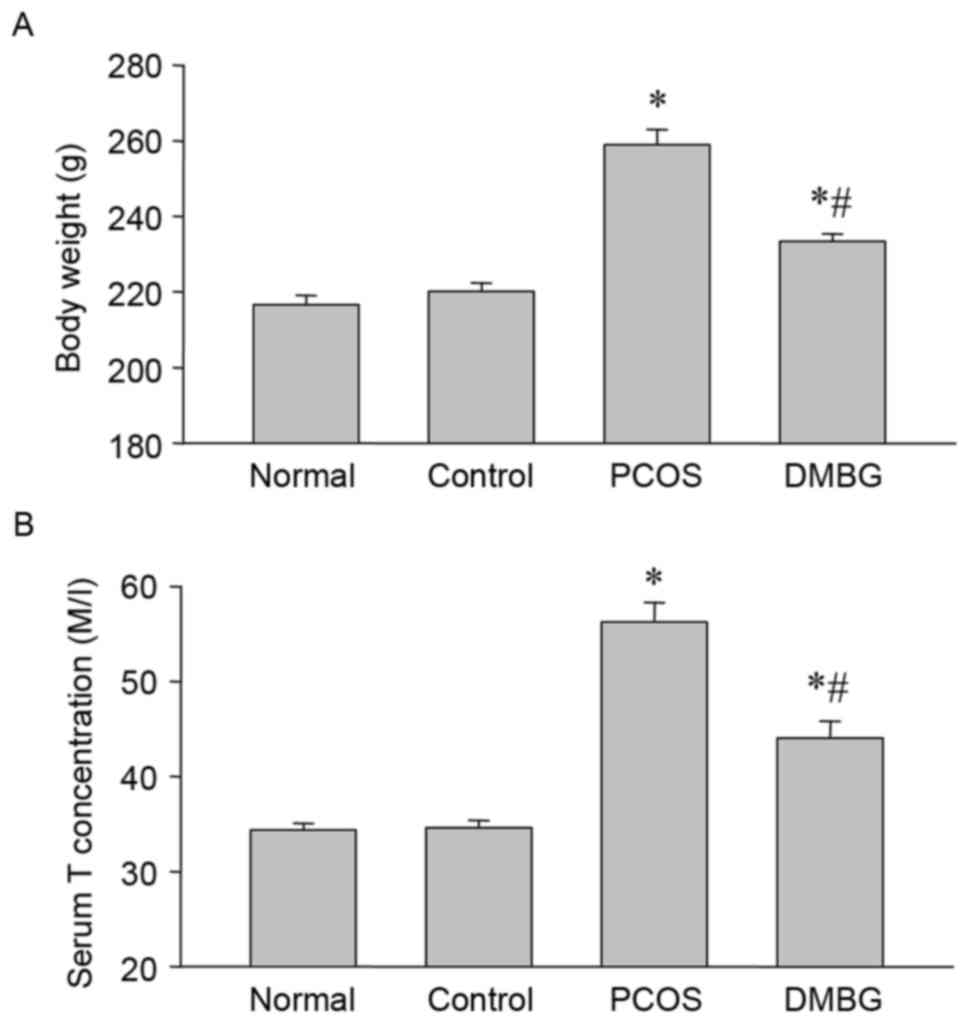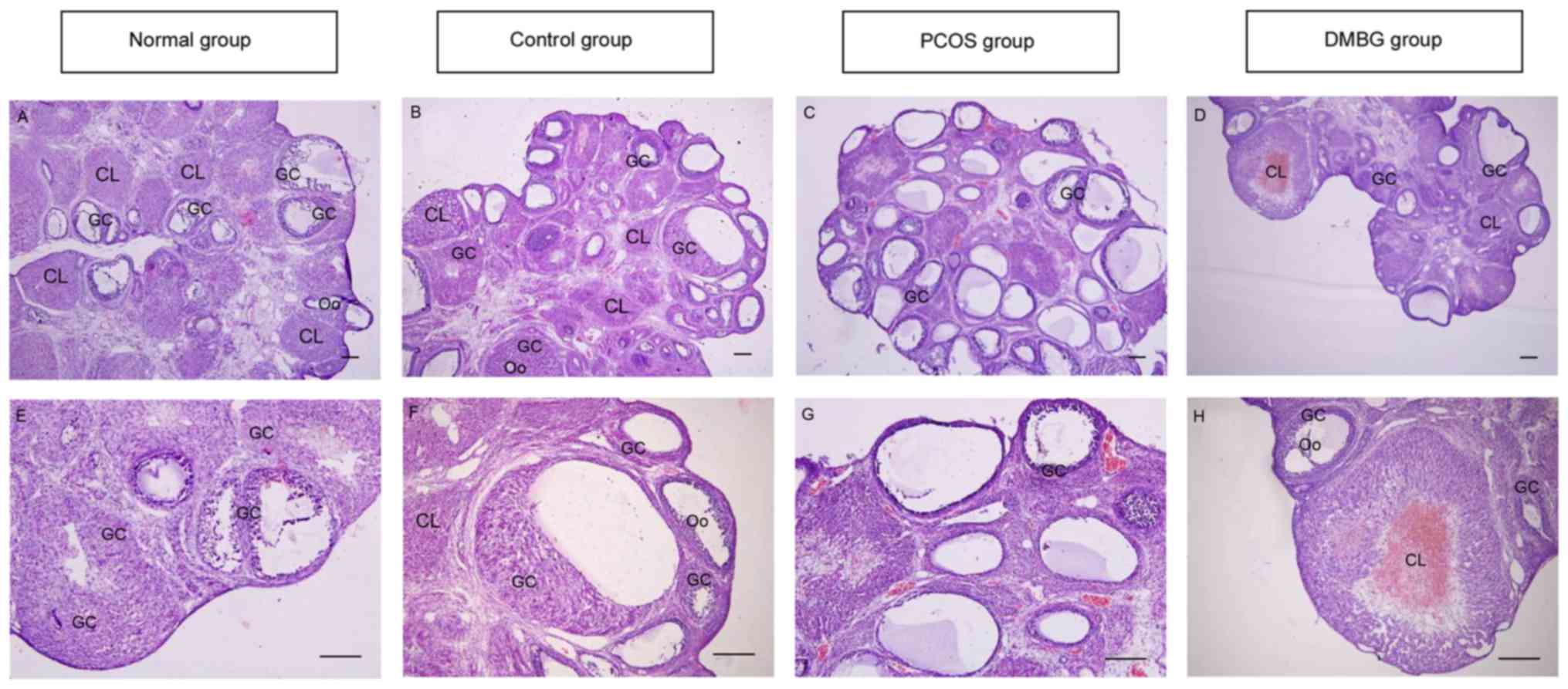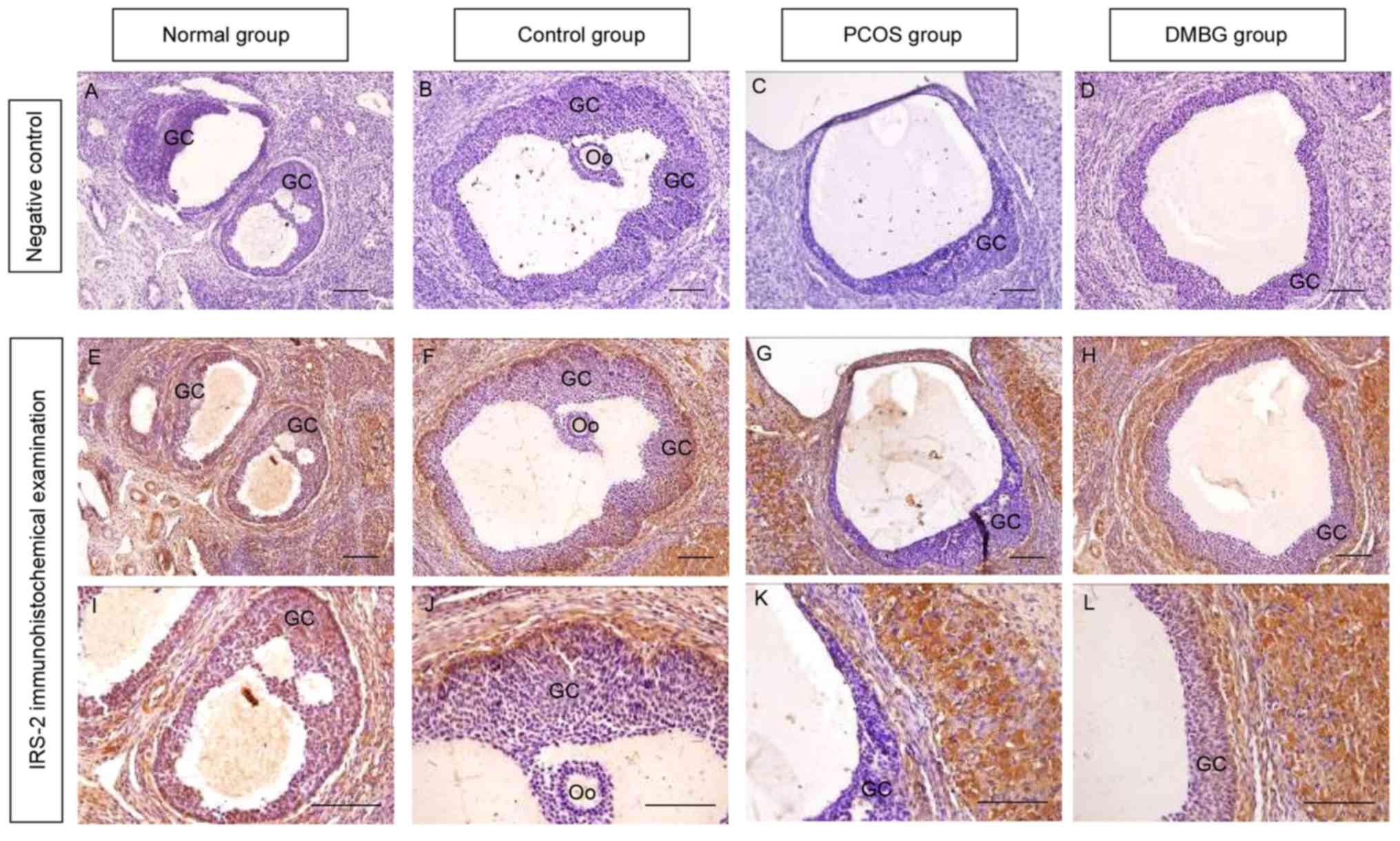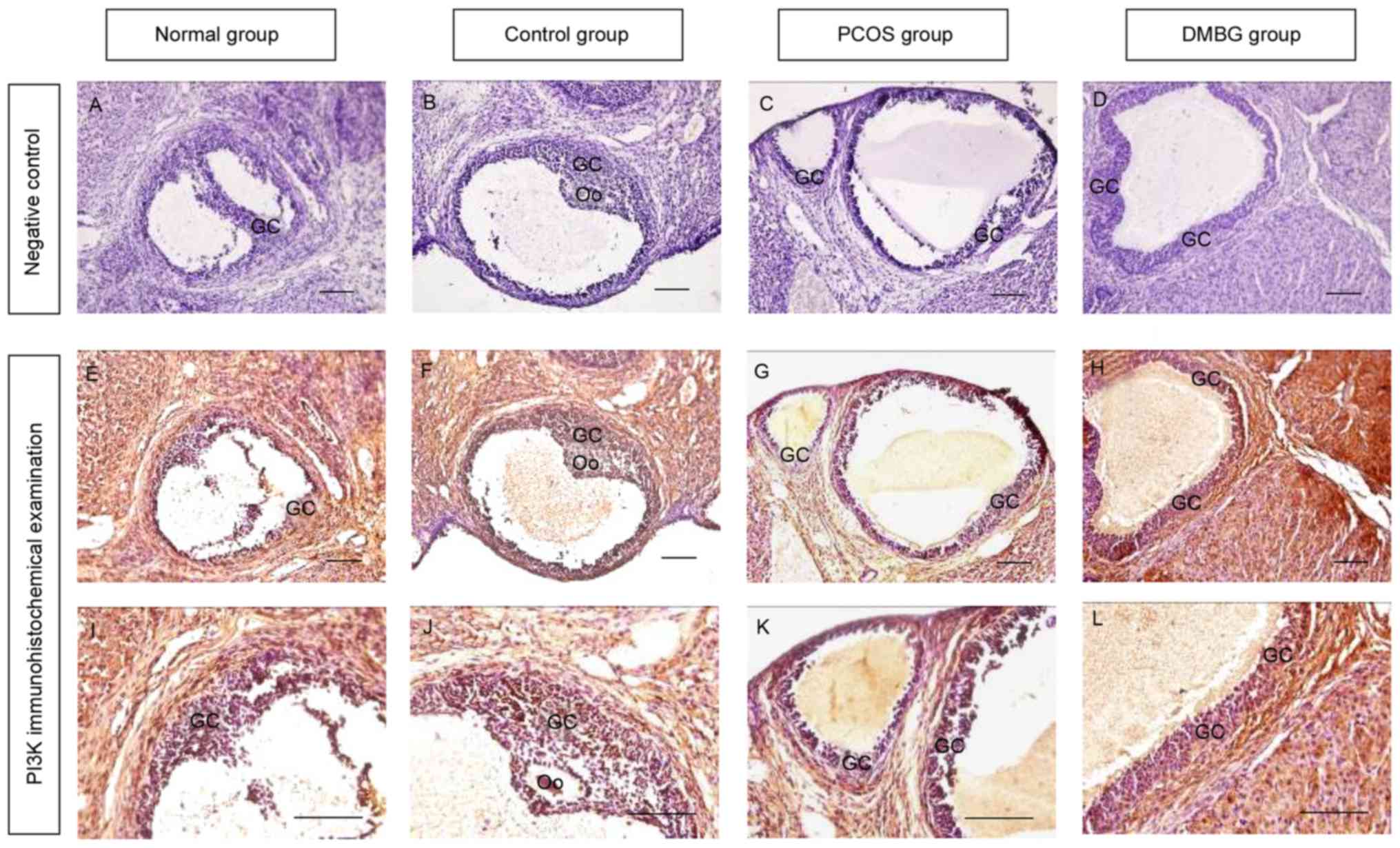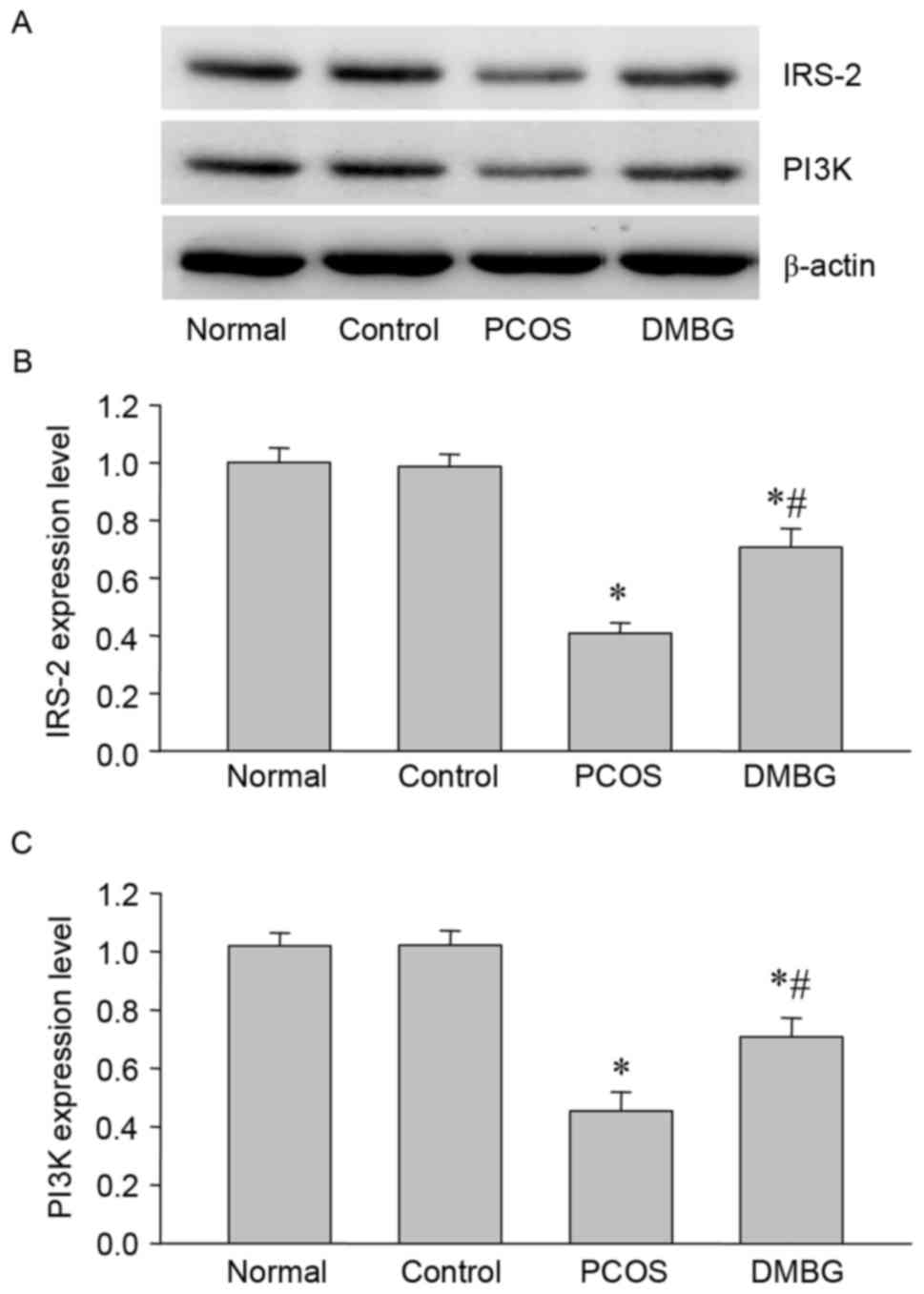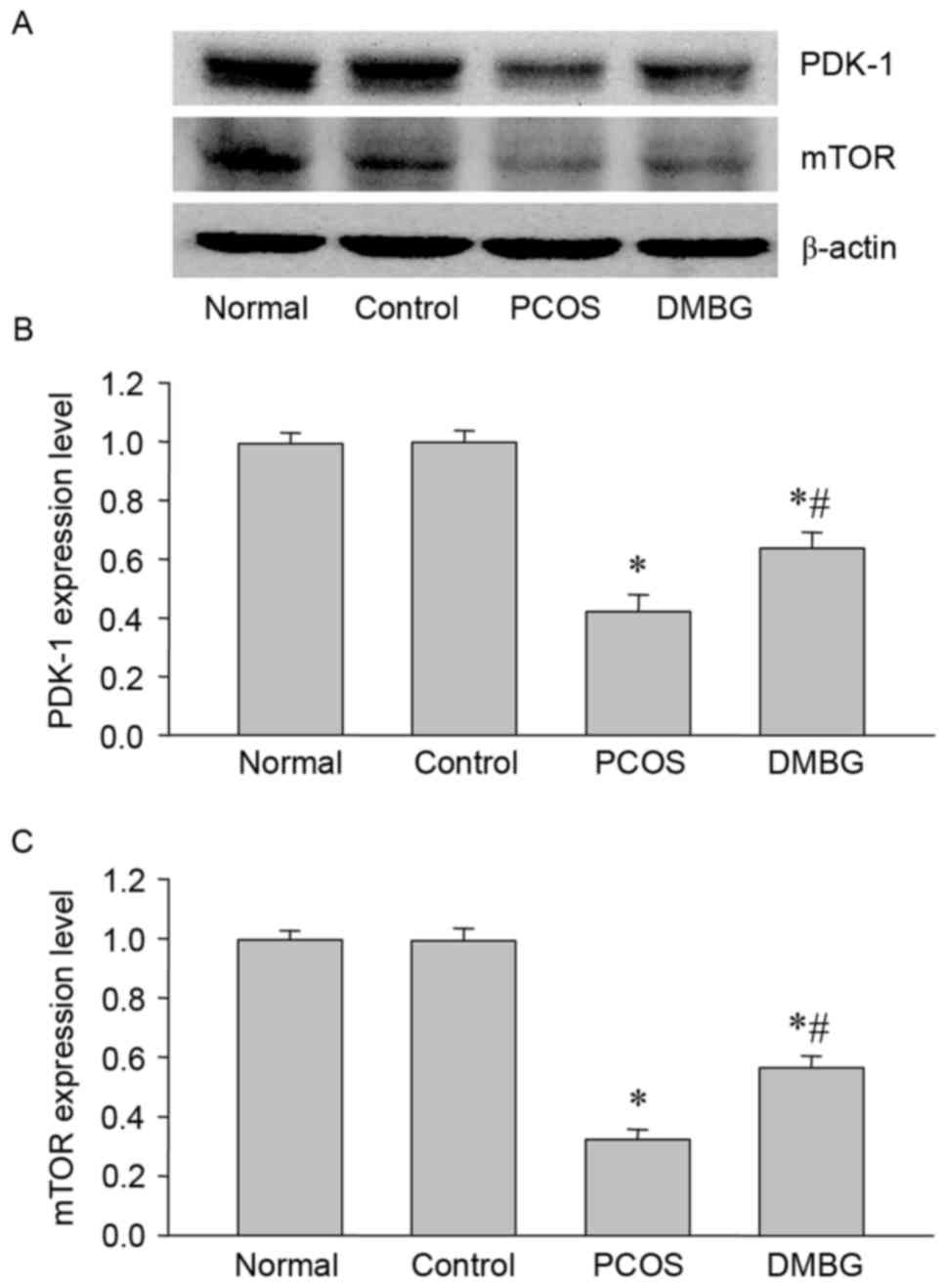|
1
|
Broekmans FJ and Fauser BC: Diagnostic
criteria for polycystic ovarian syndrome. Endocrine. 30:3–11. 2006.
View Article : Google Scholar : PubMed/NCBI
|
|
2
|
Lane DE: Polycystic ovary syndrome and its
differential diagnosis. Obstet Gynecol Surv. 61:125–135. 2006.
View Article : Google Scholar : PubMed/NCBI
|
|
3
|
Makker A, Goel MM, Das V and Agarwal A:
PI3K-Akt-mTOR and MAPK signaling pathways in polycystic ovarian
syndrome, uterine leiomyomas and endometriosis: An update. Gynecol
Endocrinol. 28:175–181. 2012. View Article : Google Scholar : PubMed/NCBI
|
|
4
|
Zhao Y, Zhang C, Huang Y, Yu Y, Li R, Li
M, Liu N, Liu P and Qiao J: Up-regulated expression of WNT5a
increases inflammation and oxidative stress via PI3K/AKT/NF-κB
signaling in the granulosa cells of PCOS patients. J Clin
Endocrinol Metab. 100:201–211. 2015. View Article : Google Scholar : PubMed/NCBI
|
|
5
|
Li T, Mo H, Chen W, Li L, Xiao Y, Zhang J,
Li X and Lu Y: Role of the PI3K-Akt signaling pathway in the
pathogenesis of polycystic ovary syndrome. Reprod Sci. 24:646–655.
2017. View Article : Google Scholar : PubMed/NCBI
|
|
6
|
Azziz R: Polycystic ovary syndrome,
insulin resistance and molecular defects of insulin signaling. J
Clin Endocrinol Metab. 87:4085–4087. 2002. View Article : Google Scholar : PubMed/NCBI
|
|
7
|
Dunaif A: Insulin resistance in women with
polycystic ovary syndrome. Fertil Steril. 86 Suppl 1:S13–S14. 2006.
View Article : Google Scholar : PubMed/NCBI
|
|
8
|
Vollenweider P: Insulin resistant states
and insulin signaling. Clin Chem Lab Med. 41:1107–1119. 2003.
View Article : Google Scholar : PubMed/NCBI
|
|
9
|
Skrgatić L, Baldani DP, Gersak K, Cerne
JZ, Ferk P and Corić M: Genetic polymorphisms of INS, INSR and
IRS-1 genes are not associated with polycystic ovary syndrome in
Croatian women. Coll Antropol. 37:141–146. 2013.
|
|
10
|
Ciaraldi TP: Molecular defects of insulin
action in the polycystic ovary syndrome: Possible tissue
specificity. J Pediatr Endocrinol Metab. 13 Suppl 5:S1291–S1293.
2000.
|
|
11
|
Diamanti-Kandarakis E, Argyrakopoulou G,
Economou F, Kandaraki E and Koutsilieris M: Defects in insulin
signaling pathways in ovarian steroidogenesis and other tissues in
polycystic ovary syndrome (PCOS). J Steroid Biochem Mol Biol.
109:242–246. 2008. View Article : Google Scholar : PubMed/NCBI
|
|
12
|
Book CB and Dunaif A: Selective insulin
resistance in the polycystic ovary syndrome. J Clin Endocrinol
Metab. 84:3110–3116. 1999. View Article : Google Scholar : PubMed/NCBI
|
|
13
|
Wu XK, Zhou SY, Liu JX, Pöllänen P,
Sallinen K, Mäkinen M and Erkkola R: Selective ovary resistance to
insulin signaling in women with polycystic ovary syndrome. Fertil
Steril. 80:954–965. 2003. View Article : Google Scholar : PubMed/NCBI
|
|
14
|
Venkatesan AM, Dunaif A and Corbould A:
Insulin resistance in polycystic ovary syndrome: Progress and
paradoxes. Recent Prog Horm Res. 56:295–308. 2001. View Article : Google Scholar : PubMed/NCBI
|
|
15
|
Shah KN and Patel SS:
Phosphatidylinositide-3 kinase: A newer molecular target in
metabolic and hormonal pathway of polycystic ovary syndrome. Exp
Clin Endocrinol Diabetes. 122:261–267. 2014. View Article : Google Scholar : PubMed/NCBI
|
|
16
|
Saltiel AR and Pessin JE: Insulin
signaling pathways in time and space. Trends Cell Biol. 12:65–71.
2002. View Article : Google Scholar : PubMed/NCBI
|
|
17
|
Tan MH, Alquraini H, Mizokami-Stout K and
MacEachern M: Metformin: From research to clinical practice.
Endocrinol Metab Clin North Am. 45:819–843. 2016. View Article : Google Scholar : PubMed/NCBI
|
|
18
|
Genazzani AD, Ricchieri F and Lanzoni C:
Use of metformin in the treatment of polycystic ovary syndrome.
Womens Health (Lond). 6:577–593. 2010. View Article : Google Scholar : PubMed/NCBI
|
|
19
|
Fruzzetti F, Perini D, Russo M, Bucci F
and Gadducci A: Comparison of two insulin sensitizers, metformin
and myo-inositol, in women with polycystic ovary syndrome (PCOS).
Gynecol Endocrinol. 33:39–42. 2017. View Article : Google Scholar : PubMed/NCBI
|
|
20
|
Tan X, Li S, Chang Y, Fang C, Liu H, Zhang
X and Wang Y: Effect of metformin treatment during pregnancy on
women with PCOS: A systematic review and meta-analysis. Clin Invest
Med. 39:E120–E131. 2016. View Article : Google Scholar : PubMed/NCBI
|
|
21
|
Genazzani AD, Strucchi C, Luisi M,
Casarosa E, Lanzoni C, Baraldi E, Ricchieri F, Mehmeti H and
Genazzani AR: Metformin administration modulates neurosteroids
secretion in non-obese amenorrhoic patients with polycystic ovary
syndrome. Gynecol Endocrinol. 22:36–43. 2006. View Article : Google Scholar : PubMed/NCBI
|
|
22
|
Genazzani AD, Lanzoni C, Ricchieri F,
Baraldi E, Casarosa E and Jasonni VM: Metformin administration is
more effective when non-obese patients with polycystic ovary
syndrome show both hyperandrogenism and hyperinsulinemia. Gynecol
Endocrinol. 23:146–152. 2007. View Article : Google Scholar : PubMed/NCBI
|
|
23
|
Wang F, Zhang Z and Wang Z, Xiao K, Wang
Q, Su J and Wang Z: Expression and clinical significance of the
HIF-1a/ET-2 signaling pathway during the development and treatment
of polycystic ovary syndrome. J Mol Histol. 46:173–181. 2015.
View Article : Google Scholar : PubMed/NCBI
|
|
24
|
Palomba S, Falbo A, Zullo F and Orio F Jr:
Evidence-based and potential benefits of metformin in the
polycystic ovary syndrome: A comprehensive review. Endocr Rev.
30:1–50. 2009. View Article : Google Scholar : PubMed/NCBI
|
|
25
|
Li X, Guo YR, Lin JF, Feng Y, Billig H and
Shao RJ: Combination of diane-35 and metformin to treat early
endometrial carcinoma in PCOS women with insulin resistance. J
Cancer. 5:173–181. 2014. View
Article : Google Scholar : PubMed/NCBI
|
|
26
|
White MF: The IRS-signaling system: A
network of docking proteins that mediate insulin and cytokine
action. Recent Prog Horm Res. 53:119–138. 1998.PubMed/NCBI
|
|
27
|
Withers DJ, Gutierrez JS, Towery H, Burks
DJ, Ren JM, Previs S, Zhang Y, Bernal D, Pons S, Shulman GI, et al:
Disruption of IRS-2 causes type 2 diabetes in mice. Nature.
391:900–904. 1998. View
Article : Google Scholar : PubMed/NCBI
|
|
28
|
Kubota N, Tobe K, Terauchi Y, Eto K,
Yamauchi T, Suzuki R, Tsubamoto Y, Komeda K, Nakano R, Miki H, et
al: Disruption of insulin receptor substrate 2 causes type 2
diabetes because of liver insulin resistance and lack of
compensatory beta-cell hyperplasia. Diabetes. 49:1880–1889. 2000.
View Article : Google Scholar : PubMed/NCBI
|
|
29
|
Burks DJ, de Mora J Font, Schubert M,
Withers DJ, Myers MG, Towery HH, Altamuro SL, Flint CL and White
MF: IRS-2 pathways integrate female reproduction and energy
homeostasis. Nature. 407:377–382. 2000. View Article : Google Scholar : PubMed/NCBI
|
|
30
|
Mlinar B, Marc J, Janez A and Pfeifer M:
Molecular mechanisms of insulin resistance and associated diseases.
Clin Chim Acta. 375:20–35. 2007. View Article : Google Scholar : PubMed/NCBI
|
|
31
|
Shepherd PR, Withers DJ and Siddle K:
Phosphoinositide 3-kinase: The key switch mechanism in insulin
signalling. Biochem J. 333:471–490. 1998. View Article : Google Scholar : PubMed/NCBI
|
|
32
|
Wang LH, Wang X, Yu XZ and Xu WT: Potent
therapeutic effects of shouwu jiangqi decoction on polycystic ovary
syndrome with insulin resistance in rats. Chin J Integr Med.
22:116–123. 2016. View Article : Google Scholar : PubMed/NCBI
|
|
33
|
Gagliardi PA, di Blasio L and Primo L:
PDK1: A signaling hub for cell migration and tumor invasion.
Biochim Biophys Acta. 1856:178–188. 2015.PubMed/NCBI
|
|
34
|
Li Y, Yang KJ and Park J: Multiple
implications of 3-phosphoinositide-dependent protein kinase 1 in
human cancer. World J Biol Chem. 1:239–247. 2010. View Article : Google Scholar : PubMed/NCBI
|
|
35
|
Siddappa D, Kalaiselvanraja A, Bordignon
V, Dupuis L, Gasperin BG, Roux PP and Duggavathi R: Mechanistic
target of rapamycin (MTOR) signaling during ovulation in mice. Mol
Reprod Dev. 81:655–665. 2014. View Article : Google Scholar : PubMed/NCBI
|















